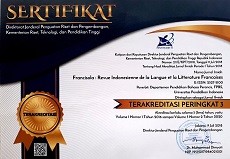Migration, le bonheur ou un espoir idéalisé ? dans « Ulysse from Bagdad » d’Éric Emmanuel Schmitt
Abstract
RÉSUMÉ. Cet article rapporte les résultats d’analyse d’« Ulysse from Baghdad », le roman d’Éric Emmanuel Schmitt, au point de vue de la question de migration. Nous nous appuyons sur les idées d’Abdelmalek Sayad (1933-1998), sociologue de l’immigration, pour répondre aux questions suivantes : Quel est le motif de la migration ? D’où vient le phénomène de la migration clandestine ? Quel est son impact sur la vie des réfugiés ? Comment cet effet socio-psychologique est-il présenté à travers une œuvre littéraire ? Quel rapport entretient Schmitt avec ce phénomène clé de notre temps ? Quelle est notre responsabilité face à ce phénomène ? On déduit qu’il faut avant toute chose donner à tout homme la possibilité de vivre dans le respect de sa dignité dans son pays. On constatera aussi que l’auteur a incité les candidats au voyage clandestin à s’éloigner des illusions et à décider avec le bon sens.
Mots-clés : Abdelmalek Sayad, Bonheur, Migration, Responsabilité, Schmitt.
ABSTRACT. This article reports the analytical findings of Eric Emmanuel Schmitt's novel, "Ulysses from Baghdad", from the point of view of the issue of migration. We rely on the ideas of Abdelmalek Sayad (1933-1998), sociologist of immigration, in order to answer the following questions: What is the reason for the migration? Where does the phenomenon of clandestine migration come from? What impact can migration have on the lives of refugees? How is this socio-psychological effect presented through a literary work? What relationship does Schmitt have with this key phenomenon of our time? What is our responsibility for this phenomenon? It is deduced that it is necessary above all to give to every man the possibility of living in the respect of his dignity in his country. It will also be noted that the author has encouraged candidates to travel underground to get away from illusions and to decide with common sense.
Keywords: Abdelmalek Sayad, Happiness, Migration, Responsibility, Schmit.
Full Text:
PDFReferences
Albert, C. (2005). L'immigration dans le roman francophone contemporain. Paris: Karthala.
Manço, A. (2006). Processus identitaires et intégration. Paris: L’Harmattan.
Dapsens, S. (2005). Les causes de migratio: pistes d’analyse et d’action. Centre Avec.
Duchet, C. (1971). Pour une sociocritique, ou variations sur un incipité: Revue Littérature, 1 :5-14
Gauthier, M. (1997). Pourquoi partir? La migration des jeunes d’hier et d’aujourd’hui, Sainte-Foy. Presses de l’Université Laval-IQRC.
Michel, F. (2009). Le corps utopique; suivi de Les hétérotopies. Paris: Éditions Lignes.
Sapiro, G. (2007). Pour une approche sociologique des relations entre littérature et idéologie . Repéré à http://journals.openedition.org/contextes/165 ; DOI : 10.4000/contextes.165
Sartre, J-P. (1948). Situations. Tome II. Paris: Gallimard.
Sayad, A. (1984). Tendances et Courants des Publications en Sciences Sociales sur l'Immigration en France Depuis 1960. Revue Current Sociology, 32: 219-304.
Sayad, A. (1999). La double absence. Des illusions de l'émigré aux souffrances de l'immigré. Paris : Seuil.
Schmitt, E-E. (2008). Ulysse from Bagdad. Paris: Éditions Albin Michel.
Schneider, A. (2013), La Littérature de jeunesse migrante. Récits d’immigration de l’Algérie à la France, Paris, L’Harmattan, coll. «Espaces littéraires».
DOI: https://doi.org/10.17509/francisola.v3i2.15752
Refbacks
- There are currently no refbacks.
Copyright (c) 2019 FRANCISOLA

This work is licensed under a Creative Commons Attribution-ShareAlike 4.0 International License.
View My Stats











